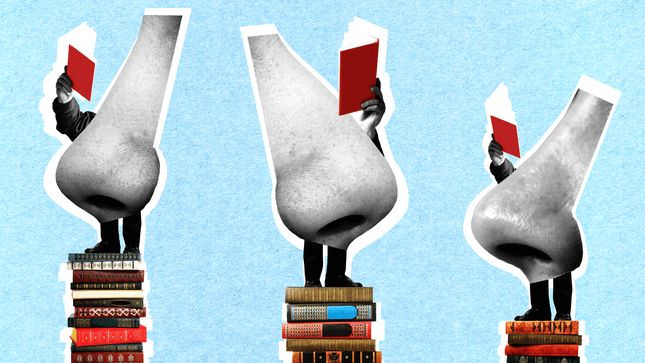We Have to Save Books from the Book People
Latest
Illustration: Elena Scotti (Photos: Getty Images, Shutterstock)
Some online discourses resurface as if on schedule, like an itch that can never be scratched to satisfaction. I’d like to prescribe a salve for one of Twitter’s most obnoxious perennial obsessions: fulminating about the books we were assigned in high school. I’ve been going online to complain about stuff since the first Clinton administration and I’ve been teaching English for seven years, so please trust me when I say that we have to stop doing this. We look like idiots.
While these types of arguments have been around for a long time, they seem to have reached a fever pitch recently, and it seems like every week there is someone online aggressively denouncing a book you may foggily recall from a high school reading assignment.
It’s become a tweet genre, with threads of people calling The Great Gatsby “pointless,” “amateurish trash,” and intriguingly, “full of plot holes.” The Catcher in the Rye commits the sin of having an unlikeable protagonist. Descriptions of the assigning process are graphic and physical. People in their 30s and 40s describe having been “forced” to read, or object to having books “pushed on” them or, in extreme cases, “shoved down their throats.”
Some teachers in these discussions agree, arguing that students respond best to books that reflect their own life experiences, and I can see why; it’s easy to blame a teenager’s rejection of The Scarlet Letter on the book’s publication date, repressed Puritan characters, and alleged sexism. But I’ve always suspected the real problem readers have with The Scarlet Letter is that it asks you to sympathize with characters who behave in unreasonable ways. That book annoyed the hell out of me in high school. I remember wondering, why doesn’t Hester just leave this dumbass town if they all think she’s a whore? Why doesn’t Dimmesdale just tell everyone he’s Pearl’s father? It couldn’t be worse than torturing himself all those years. The simple answer is, of course, because then you wouldn’t have a novel. But the simple answer is also: Because that’s not how people behave. People get stuck in place. People imprison themselves in their own inertia and guilt. And everyone has their own idea of what honor is. This makes for an almost unbearably sad story. I don’t know if that means high school students shouldn’t read it. But I don’t think it’s a tragedy, or even a problem, if a student is annoyed or baffled by a book. It’s not an English teacher’s job to make students love reading; an English teacher’s job is to equip students to read and communicate. When I teach literature, my goal is to give students the tools and confidence they need to attack and write about texts, to “talk to” the text rather than receive it passively.
In my experience how a student processes and appreciates books is a function less of any particular book’s age or content than how the book is taught, or that it’s being assigned and taught in the first place.
The classic books’ detractors go beyond saying a particular novel is inaccessible or boring, though, arguing that these books actually “turn kids off” reading forever. But this assumes a tidy cause-and-effect that disregards all the circumstances that create readers and sustain a reading habit: parental attitudes, family wealth, the student’s disposition and other sources of stimulation. Moreover, in my experience how a student processes and appreciates books is a function less of any particular book’s age or content than how the book is taught, or that it’s being assigned and taught in the first place.
-

-

-

-

-

-

-

-

-

-

-

-

-

-

-

-

-

-

-

-

-

-

-

-

-

-

-

-

-

-

-

-

-

-

-

-

-

-

-

-








































